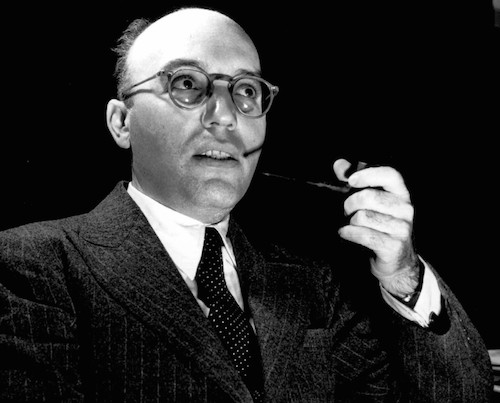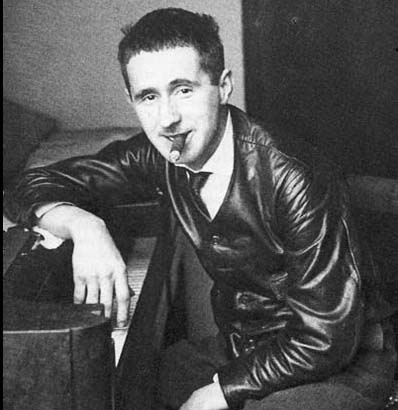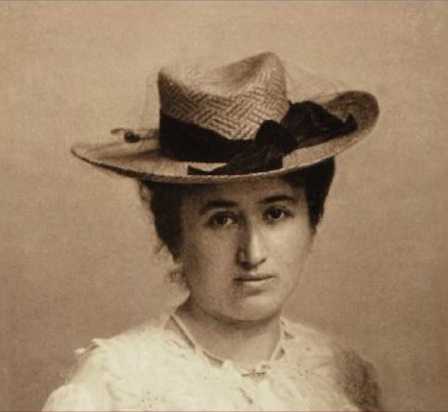


I have never acknowledged the difference between "serious" and "light" music. There is only good and bad music. ‐ Weill in an interview with the New Republic in 1940
 |
 |
 |
| Kurt Weill | Bertolt Brecht | Rosa Luxemburg |
Concerto for Violin and Wind Orchestra, Op. 12
played by Nona Liddell with the London Sinfonietta conducted by
David Atherton
I: Andante con moto (9'43)
II: Notturno (10'32)
III: Allegro molto, un poco agitato (6'53)
The title The Berliner Requiem is in no way ironic
‐ rather, we wanted to try to express what the
city-dweller
thinks about death. The piece is a series of
laments, memorials and epitaphs ‐
so, in the end, a
secular requiem. ‐ Kurt Weill, 1929
The "distancing effect" has been used in Germany in plays
of a non-Aristotelian kind, that is, in plays that are not
based on empathy. I refer to various attempts to act in such
a manner that the spectator is prevented from feeling his way
into the characters. Acceptance or rejection of the
characters' words is thus placed in the conscious realm, not,
as hitherto, in the spectator's subconscious.
‐ Bertolt Brecht, "On Chinese Acting," 1936
For years I have been the only creative musician to work
consistently and uncompromisingly, against the resistance of
the snobs and aesthetes, to create basic forms of a
new, simple, popular musical theatre. Even the least of the
theatre works I have produced during this period has arisen
under the impress of this responsibility and from a constant
effort to pursue a line of development which seems, to me, the
only one possible. ‐ Weill to his publisher, 1929
Berliner Requiem
performed by the Flemish Radio Choir and I Solisti del
Vento conducted by Paul Hillier, with Ivan Goossens (tenor) and
Jacob Bloch Jespersen (bass)
Text by Bertolt Brecht, and English translation, are here.
I: Grosser Dankchoral ‐ Great Hymn of Thanksgiving (2'55)
II: Ballade vom ertrünkenen Mädchen ‐
Ballad of the drowned girl (2'25)
III: Epitaph ‐ Epitaph (1'40)
IV: Erster Bericht über den Unbekannten Soldaten unter
dem Triumphbogen ‐ First Report on the Unknown
Soldier under the Triumphal Arch (4'09)
V: Zweiter Bericht über den Unbekannten Soldaten unter
dem Triumphbogen ‐ Second Report on the Unknown
Soldier under the Triumphal Arch (5'24)
VI: Grosser Dankchoral ‐ Great Hymn of Thanksgiving (2'55)
From Dreigroschenoper ‐ The Threepenny Opera
with the Sender Freies Berlin conducted by Wilhelm Brückner-Rüggeberg
Die Morität von Mackie Messer
‐ The Ballad of Mack the Knife (3'10)
sung by Wolfgang Neuss
| Und der Haifisch, der hat Zähne, | Oh the shark, he has teeth, | |
| Und die trägt er im Gesicht | And he shows them in his face, | |
| Und Macheath, der hat ein Messer, | And Macheath, he has a knife, | |
| Doch das Messer sieht man nicht. | But a knife that no one sees. | |
| Ach, es sind des Haifischs Flossen | Oh, the shark's fins appear | |
| Rot, wenn dieser Blut vergiesst. | Red, when he spills blood; | |
| Mackie Messer trägt'nen Handschuh | Mack the Knife, when he wears gloves, | |
| Drauf man keine Untat liest. | Leaves no trace of his crimes. | |
| An 'nem schönen blauen Sonntag | On a beautiful, clear Sunday | |
| Liegt ein toter Mann am Strand, | A dead man lies on the beach | |
| Und ein Mensch geht um die Ecke, | And a man sneaks round the corner | |
| Den man Mackie Messer nennt. | Whom everyone calls Mack the Knife. | |
| Und Schmul Meier bleibt verschwunden, | And Schmul Meier disappeared for good | |
| Und so mancher reiche Mann, | As did so many rich men, | |
| Und sein Geld hat Mackie Messer, | And Mack the Knife has his money, | |
| Dem man nichts beweisen kann. | How he got it no one knows. | |
| Jenny Towler ward gefunden | Jenny Towler was discovered | |
| Mit 'nem Messer in der Brust, | With a knife in her breast; | |
| Und am Kai geht Mackie Messer, | By the docks goes Mack the Knife, | |
| Der von allem nichts gewusst. | Who knows nothing about it. | |
| Und das grosse Feuer in Soho, | And the big fire in Soho | |
| Sieben Kinder und ein Greis, | Did in seven kids and an old man | |
| In der Menge Mackie Messer, den | In the crowd is Mack the Knife, | |
| Man nichts fragt und der nichts weiss. | Who isn't questioned and knows nothing. | |
| Und die minderjährige Witwe, | And the teenaged widow | |
| Deren Namen jeder weiss, | Whose name everyone knows, | |
| Wachte auf und war geschändet, | Woke up and got raped; | |
| Mackie, welches war dein Preis? | Mackie, what did you pay for that? | |
| (Words by Bertolt Brecht) |
Ballade über die Frage: "Wovon lebt der Mensch?"
‐ Ballad about the question: "How does a man stay alive?" (3'56)
sung by Erich Schellow and Lotte Lenya
| MACHEATH: | ||
| Ihr Herrn, die ihr uns lehrt, wie man brav leben | You gentlemen, who teach us how to be upstanding | |
| Und Sünd und Missetat vermeiden kann | And how to avoid sins and evil acts | |
| Zuerst müsst ihr uns was zu fressen geben | First you've got to give us some grub, | |
| Dann könnt ihr reden: damit fängt es an. | Then you can talk: with that it all begins. | |
| Ihr, die euren Wanst und unsre Bravheit liebt | You who love your paunches and our virtue | |
| Das eine wisset ein für allemal: | Just learn this truth once and for all: | |
| Wie ihr es immer dreht und wie ihr's immer schiebt | No matter how you turn or twist it, | |
| Erst kommt das Fressen, dann kommt die Moral. | First comes the grub, then the morals. | |
| Erst muss es möglich sein auch armen Leuten | First there has to be a chance, even for poor people, | |
| Vom grossen Brotlaib sich ihr Teil zu schneiden. | To cut their share of the big loaf of bread. | |
| Denn wovon lebt der Mensch? | For how does a man stay alive? | |
| Denn wovon lebt der Mensch? Indem er stündlich | For how does a man stay alive? By every hour | |
| Den Menschen peinigt, auszieht, anfällt, abwürgt und frisst. | Torturing, stripping, attacking, throttling, and devouring other men. | |
| Nur dadurch lebt der Mensch, dass er so gründlich | A man just stays alive by completely | |
| Vergessen kann, dass er ein Mensch doch ist. | forgetting that he is a man at all. | |
| CHORUS: | ||
| Ihr Herren, bildet euch nur da nichts ein: | Gentlemen, just don't misunderstand: | |
| Der Mensch lebt nur von Missetat allein! | A man lives by evil acts alone! | |
| JENNY: | ||
| Ihr lehrt uns, wann ein Weib die Röcke heben | You teach us when a woman may lift up her skirts | |
| Und ihre Augen einwärts drehen kann | And also when she may give you the eye. | |
| Zuerst müsst ihr uns was zu fressen geben | First you've got to give us some grub, | |
| Dann könnt ihr reden: damit fängt es an. | Then you can talk: with that it all begins. | |
| Ihr, die auf unsrer Scham und eurer Lust besteht | You, who insist on our shame and your lust, | |
| Das eine wisset ein für allemal: | Just learn this truth once and for all: | |
| Wie ihr es immer dreht und wie ihr's immer schiebt | No matter how you turn or twist it, | |
| Erst kommt das Fressen, dann kommt die Moral. | First comes the grub, then the morals. | |
| Erst muss es möglich sein auch armen Leuten | First there has to be a chance, even for poor people, | |
| Vom grossen Brotlaib sich ihr Teil zu schneiden. | To cut their share of the big loaf of bread. | |
| MACHEATH: | ||
| Denn wovon lebt der Mensch? | For how does a man stay alive? | |
| JENNY: | ||
| Denn wovon lebt der Mensch? Indem er stündlich | For how does a man stay alive? By every hour | |
| Den Menschen peinigt, auszieht, anfällt, abwürgt und frisst. | Torturing, stripping, attacking, throttling, and devouring other men. | |
| Nur dadurch lebt der Mensch, dass er so gründlich | A man just stays alive by completely | |
| Vergessen kann, dass er ein Mensch doch ist. | forgetting that he is a man at all. | |
| CHORUS: | ||
| Ihr Herren, bildet euch nur da nichts ein: | Gentlemen, just don't misunderstand: | |
| Der Mensch lebt nur von Missetat allein! | A man lives by evil acts alone! | |
| (Words by Bertolt Brecht) |
From Mahagonny-Songspiel
played by the RIAS Berlin Sinfonietta conducted by John Mauceri
Kleiner Marsch ‐ Little March (1'06)
Alabama Song
sung by Ute Lemper and Susanne Tremper
Oh, show us the way to the next whisky bar,
Oh, don't ask why, oh, don't ask why!
For we must find the next whisky bar
For if we don't find the next whisky bar
I tell you we must die.
Oh, moon of Alabama,
We now must say good-bye,
We've lost our good old mamma
And must have whisky, oh you know why!
Oh, show us the way to the next pretty boy,
Oh, don't ask why, oh, don't ask why!
For we must find the next pretty boy
For if we don't find the next pretty boy
I tell you we must die.
Oh, moon of Alabama, etc.
Oh, show us the way to the next little dollar,
Oh, don't ask why, oh, don't ask why!
For we must find the next little dollar
For if we don't find the next little dollar
I tell you we must die.
Oh, moon of Alabama, etc.
(Words by Bertolt Brecht)

Kurt Weill and Lotte Lenya
Lost in the Stars from Lost in the Stars (4'00)
sung by Lotte Lenya
Lord of the heart,
Look down upon our earthly pilgrimage,
Look down upon us where we walk
From bright dawn to old age,
Give light not shed by any sun,
Lord of the heart!
Not read on any page,
Lord of the heart!
Before Lord God made the sea and the land,
He held all the stars in the palm of his hand,
And they ran through his fingers like grains of sand,
And one little star fell alone.
Then the Lord God hunted through the white night air
For the little dark star in the wind down there,
And he stated and promised he'd take special care
So it wouldn't get lost again.
Now, a man don't mind if the stars get dim
And the clouds blow over and darken him
So long as the Lord God's watching over him
Keeping track how it all goes on.
But I've been walking through the night and the day
Till my eyes get weary and my head turns gray,
And sometimes it seems maybe God's gone away,
Forgetting the promise that we heard him say,
And we're lost out here in the stars.
Little stars, big stars, blowing through the night,
And we're lost out here in the stars,
Little stars, big stars, blowing through the night,
And we're lost out here in the stars.
(Words by Maxwell Anderson)
September Song from Knickerbocker Holiday (3'46)
sung by Lotte Lenya
Oh, it's a long, long while
From May 'til December,
And the days grow short
When you reach September.
When the autumn weather
Turns the leaves to flame,
One hasn't got time
For the waiting game.
For the days dwindle down
To a precious few ‐
September, November ‐
And these few precious days
I'll spend with you.
These precious days
I'll spend with you.
When you meet with a young man early in spring
They court you in song and rhyme.
They woo you with words and a clover ring,
But if you examine the goods they bring,
They have little to offer but the songs they sing
And a plentiful waste of time of day ‐
And a plentiful waste of time.
But it's a long, long while... etc.
(Words by Maxwell Anderson)
Sing Me Not A Ballad from The Firebrand of Florence (4'17)
sung by Lotte Lenya
I am not like Circe,
Who showed men no mercy;
Men are most important in my life.
Venus, Cleo, Psyche
Are melodies in my key;
They knew how to live the high life.
Gallantry I find archaic.
Poetry I find prosaic.
Give me the man who's strong and silent:
Inarticulate ‐ but violent.
Sing me not a ballad,
Send me not a sonnet.
I require no ballad:
Rhyme and time are wasted on it.
Save your books and flowers;
They're not necessaries.
Oh, the precious hours
Lost in grim preliminaries!
Deck me not in jewels;
Sigh me not your sighs;
Duel me no duels;
And ‐ please don't vocalize.
Romance me no romances;
Treasure not my glove.
Spare me your advances ‐
Just, oh just make love!
(Words by Ira Gershwin)